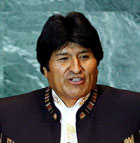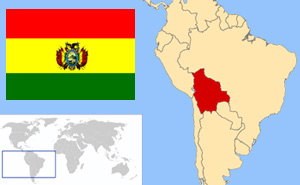Indigenous groups back Bolivia’s leader
By Kintto Lucas | Last updated: Oct 8, 2008 - 8:11:00 AMWhat's your opinion on this article?

Bolivian Pres. Evo Morales
Photo:UN Photo/Marco Castro |
QUITO, Bolivia (IPS/GIN) - Indigenous organizations from several countries in Latin America declared their solidarity with Bolivian President Evo Morales with respect to the crisis in his country, and are preparing a major gathering in La Paz, Bolivia, within the next few weeks.
Humberto Cholango, the head of Ecuarunari, which groups Quechua communities from Ecuador’s highlands region, warned that an attempted coup against President Morales could trigger a generalized uprising by indigenous people throughout the Andean region.
“The indigenous movement in Ecuador and other countries is on the alert to any attempt to overthrow our brother Evo (Bolivia’s first-ever indigenous president) by economic power groups backed by the government of the United States,” Mr. Cholango told IPS.
“The U.S. government has always meddled in the affairs of the countries of Latin America, and lately has supported attempts to organize coups in Venezuela and Bolivia,” the native leader said.

|
Ecuarunari, the biggest association within the powerful Ecuadorean Confederation of Indigenous Nationalities (CONAIE), also forms part of the Unidad por el SÌ y el Cambio, a coalition of urban and rural social organizations that are independent from and critical of the government of left-leaning President Rafael Correa.
Unidad por el SÌ y el Cambio was the first organization to publicly declare its solidarity with Bolivia, urging President Correa on Sept. 11 to offer his unconditional support to the Morales administration.
The manifesto signed by more than 100 social organizations and dozens of personalities warned that in Bolivia there are “attempts by economic power groups to destabilize the democratic government, with the support of the U.S. ambassador, and by resorting to armed violence against the civilian population.”
It added that the Bolivian government and people are engaged in a determined effort to “build a country based on equality and fully integrated with the rest of Latin America.”
On Sept. 11, between 15 and 30 indigenous supporters of President Morales were killed and dozens injured in what has been dubbed the “Porvenir massacre,” for the town near the spot where it occurred in Bolivia’s northern Amazon jungle province of Pando.
The survivors described the incident as an “ambush” by the opposition, and video footage shows people desperately swimming across a river to escape, under gunfire. Several dozen people who went missing after the incident are still being sought in the surrounding bush and rivers by the security forces and local families.
The rightwing governor of Pando, Leopoldo Fernandez, is under arrest and facing trial for inciting violence.
The incident was the bloodiest in over a week of often violent protests by the rightwing opposition in Bolivia’s relatively wealthy eastern provinces.
On Sept. 12, a number of indigenous organizations and social movements created the Bolivia Solidarity Committee.
“We will not allow the violence, racism and xenophobia against indigenous people and poor peasant farmers to take root in the region, as occurred on Thursday (Sept. 11) in the Bolivian department (province) of Pando,” Mr. Cholango said.
“We indigenous people are carrying forward peaceful changes, in democracy. We don’t want violence, but if there is provocation, we can respond, as we have shown before,” said Mr. Cholango, who is also a leader of the Andean Coordinator of Indigenous Organizations (CAOI), which brings together groups from Argentina, Bolivia, Chile, Colombia, Ecuador and Peru.
The indigenous leader said that “a great global chain of solidarity with Bolivia” is being created by indigenous and social organizations as well as intellectuals throughout South America, which will culminate in a major demonstration in La Paz.
Indigenous Mexican immigrants in the United States, organized in the Embassy of Indigenous Peoples, also expressed support for Morales.
They also condemned “the acts of violence perpetrated by paramilitaries” in Bolivia and “legal meddling and manipulation” by the United States “which led to the direct consequence that the ambassador in Bolivia was named persona non grata.”
Indigenous organizations from Guatemala, Colombia, Peru, Chile, Panama and Venezuela also expressed their solidarity with the Bolivian government.
Related links:
U.S. covers its tracks in Bolivia (FCN, 09-30-2008)
North American tribal leaders energized by Morales meet (FCN, 10-23-2006)
Evo Morales and the roots of revolution (FCN, 02-07-2006)
INSIDE STORIES AND REVIEWS
-
-
About Harriett ... and the Negro Hollywood Road Show
By Rabiah Muhammad, Guest Columnist » Full Story -
Skepticism greets Jay-Z, NFL talk of inspiring change
By Bryan 18X Crawford and Richard B. Muhammad The Final Call Newspaper @TheFinalCall » Full Story -
The painful problem of Black girls and suicide
By Charlene Muhammad -National Correspondent- » Full Story -
Exploitation of Innocence - Report: Perceptions, policies hurting Black girls
By Charlene Muhammad -National Correspondent- » Full Story -
Big Ballin: Big ideas fuel a father’s Big Baller Brand and brash business sense
By Bryan Crawford -Contributing Writer- » Full Story






 Click Here Stay Connected!
Click Here Stay Connected!








